Ignorance is not always bliss; not when the climate and pristine ecology is at stake. A change in the climate that has served millions of life forms from the beginning of time does not just affect our surroundings. It ropes in our future generations too.
Two years ago, I crossed the Rohtang Pass (Alt. 3978 meters) on my motorcycle that stands like a mighty wall between the district Kullu and Lahaul-Spiti in the state of Himachal Pradesh, India. My destination was Udaipur – a small town on the bank of River Chandrabhaga surrounded by towering high snow-clad mountains. What conspired on my way back from Udaipur forever changed the way I looked at the ways of us mortals, Himalayas, tourism industry and more importantly, theories of climate change!
Rohtang is not just a pass
Come summers and it’s time to pack our bags and head towards the Himalayas. Rohtang is all time favorite of both foreign and domestic tourists because it is easily accessible and even if you get stuck, the Border Roads Organization is always there for the rescue.
Not so long ago, Rohtang was just a tourist spot for me. I perceived Rohtang as a place where honeymooners get their photographs clicked in tribal dresses (Which the real tribes do not wear anymore), spend more than they should, and stroll at the Manali mall road.
One crazy motorcycle ride in the Himalayas changed my perception about the Rohtang Pass, forever.
Rohtang is not just a pass, tourist spot or a honeymooners’ paradise. It is, in fact, the lifeline of the Lahaul Valley. It’s Rohtang that enables tribal communities of the cold desert to connect to the world outside.
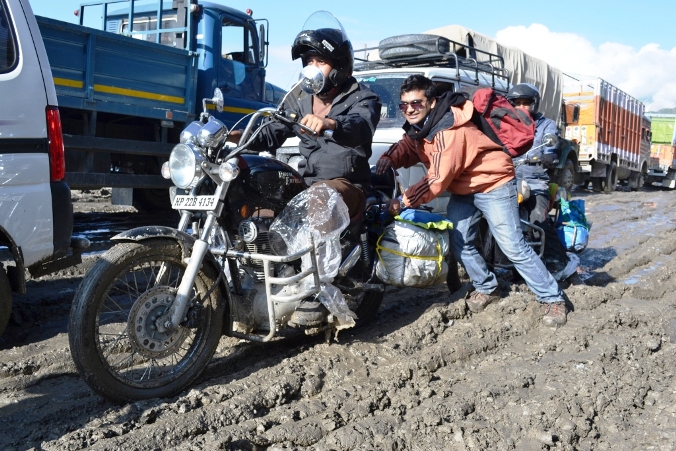
“Where have you come from?” the old man asked in a harsh and bitter tone.
“Sir, I belong to Himachal. Sundernagar,” I responded immediately, and hoped forsome gentleness in his tone in the next sentence.
He did not utter a single word for the next few minutes.
He got busy on his phone and I couldn’t help thinking about him. I could not understand the reason why he was quiet. Is there something wrong with me? May be my beard, I thought and shrugged.
I wanted to ask him so many things about the place and the folklore. An old man can always tell you stories, so I thought of giving it a chance and sat next to him. I wanted to know how they managed to live in the valley with all the roads closed down and snow walls as high as 6 meters around them.
The old man, however, was not in a welcoming mood. Yet I mustered up some courage and asked him again, “Sir, how do you manage…”
Before I could finish, he interrupted me and said, “You want to listen to our story. Come and listen.”
What followed next was beyond my imagination. I always had the wrong idea about about life on the other side of the Himalayas! The verbatim conversation follows next.
“Opening of the Rohtang means a lot to us – all of us who appear to be nice and happy people to you, and all the tourists who love clicking photographs with us so that they can show it to their friends. For you, it means getting closer to the nature, exploring the unexplored and being adventurous. For us, it means getting back to somewhat normal living conditions. The Sun you see, is important for all of us and we are no exception. You do not have to buy groceries for six months in advance – we have to. But that is not your fault – that is just the randomness of this life and I don’t have any problems with that.”
I had no clue of where all this was going. My head was tense. I ordered my third cup of tea to make myself relaxed.
The old man went on, “I lost my grandson last year because of this tourist mad rush. We were going to Manali hospital as soon as Rohtang opened because that is what we can do when there are no helicopters. The state government cannot afford frequent helicopter rides. My grandson held on, he managed to survive when the roads were closed; he managed to hold on when there were no helicopter rides for him. We were hopeful that Dev Rohtang will help us because Gods never fail us. But the tourist season made a mess of our lives.”
I was still not on the same page and now the dhaba owner decided not to make any tea, as he shared sentiments of the old man. He sat close to me on the floor.
“You come with your big cars, big families and then drive it as if you own the road. Look at Rohtang, what have you done to it? You drive fanatically, pick petty fights for overtaking, and you are in a hurry; always. You park like crazy, disturb the traffic and how does it affect you? It never affects you, it affects us, and we lose our dear ones. We can’t wait in the traffic admiring the natural beauty with patients for hours. We have to see our dear ones die in front of us. Why? Did you ever think of that? Because your amusement becomes our punishment! That little kid died and he could have been saved. We waited for three hours in the traffic and when the traffic opened, there was no life left in him. I hear tourists had blocked the road because they were fighting over a broken indicator or head light, and they were waiting for the insurance guys so that they could get their compensation. I wonder how mother of my son will ever be compensated.”
Towards its end, it had become a sad story. All of a sudden it started to make all the sense. I myself have seen people lining up randomly on their way towards Rohtang. They park vehicles in the middle of the road, drive like crazy, and not to forget park wherever they want to because a photograph in the snow is important.
The old man continued, “You come here every year. You bring plastic bottles, beer cans, hygienic packed food, cold drinks, and what not! You eat them and don’t even care to put them in the waste basket. Yes, we don’t have enough waste baskets here but can you not just leave the place as it is?
Just clean and normal – so that we don’t have to pay for your faults! Every year you Leh bikers wait eagerly for opening of Rohtang. Do you even know what it takes to clear the road? Let me tell you, it becomes hard to tell between skin and leather, that’s how sun burns us when we try to clean the road for you. Have you ever met a BRO soldier who has lost his hands trying to clean the road for you? Have you ever met a soldier who can’t afford to pay for his skin treatment that has become animal-like while cleaning the road for you? You can’t drink water from natural sources and then you buy your water bottles and you need beer cans too.
Have you ever seen the pile of plastic bottles and cans that you leave behind when the summer season closes and we try to get back to our normal lives? We never find the place as good as it was in the previous year. And this has been happening since ages. Every year we clean up the road, clean up your trash and then the next year – you come again.
Why is Rohtang sinking, do you have any clue? It is sinking because you care only about your well-being. You need clean water to drink, clean food to eat and above that you need polythene bags to cover your shoes and socks which might get ‘wet’ while you move towards Leh on your bikes. Do you even care to put that plastic back in your bag so that the mountains remain clean?”
I was shell shocked to see photographs of truckloads of plastics dumped at the Rohtang top, on his mobile phone. [Not the above pic]
“The Gods have never failed us, son. It is our fellow brothers who have failed us, always.”
These were the last words the old man said to me and moved out of the dhaba.
The whole conversation left me dumbfounded.
I promised him that I will not leave this place worse than I found it; I will try to leave it better than I got it or at least help it remain the way it was.
Our cars are more precious to us than the invaluable nature. The reason is simple; we have paid for the car but nature is given to us as a gift and we do not value that. There is an old saying in Hindi, “Mufat ki cheez ki kadar nahin hoti | Nobody cares about freebies” and that’s what we are doing, disrespecting the Mother Nature for our comfort.
We don’t own the nature but why is there a dire need of owning it? Nature belongs to all those who embrace it with open arms.
Next time you go to Spiti Valley or Leh Laddakh, make sure you bring back what is not required there. Because if today you do not care, there would be nothing left for the coming generations to see.
Explore with love. Do not explore and exploit.
Nobody wants to be exploited and when nature backfires, nothing remains beautiful. Feel that it belongs to you and what you save today is what you pass on to your kids.
So next time you pay a visit to the Himalayas make sure you bring back your plastic bags, mineral water bottles, and everything else that you think might not suit the health of the Himalayas. Drive slowly in the mountains because you are there to enjoy your vacations and not to compete in the vicious office-home cycle.
Take one step at a time – mend your ways and motivate your brethren to do the same. Climate change is not what it seems. It looks like a matter of mass ignorance. People just do not know what is good and what is bad for them, in the long run. We ought to attune ourselves to the tone of the nature.
The sole aim of this story is to help my ‘fellow-brothers’ understand that we need to wake up and take stock of the damage we have caused already. We need to change our ways if we care to see the future generation’s old man happy and Himalayas divine, beautiful and tranquil forever.
*******
A Civil Engineering graduate from NIT Hamirpur, Tarun has worked in the hydro power and IT sectors in the past. He loves writing and sharing the positive stories floating around in the society, which usually go unnoticed.
For over 2 years, Tarun wandered around the passes, mountain peaks, dangerous roads, and remote villages in the Indian state of Himachal Pradesh on his motorcycle.


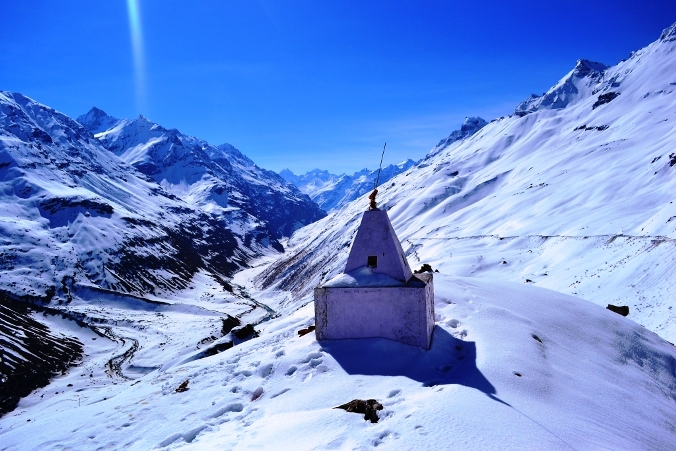
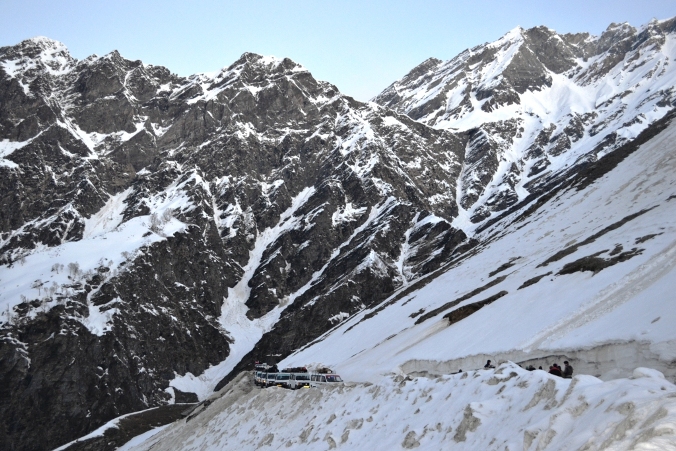
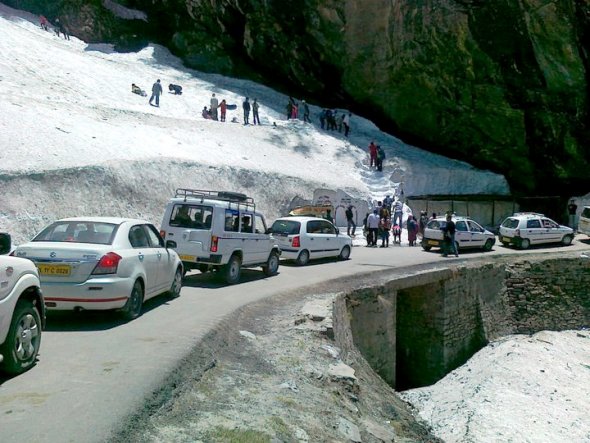 The old man went on, “I lost my grandson last year because of this tourist mad rush. We were going to Manali hospital as soon as Rohtang opened because that is what we can do when there are no helicopters. The state government cannot afford frequent helicopter rides. My grandson held on, he managed to survive when the roads were closed; he managed to hold on when there were no helicopter rides for him. We were hopeful that Dev Rohtang will help us because Gods never fail us. But the tourist season made a mess of our lives.”
The old man went on, “I lost my grandson last year because of this tourist mad rush. We were going to Manali hospital as soon as Rohtang opened because that is what we can do when there are no helicopters. The state government cannot afford frequent helicopter rides. My grandson held on, he managed to survive when the roads were closed; he managed to hold on when there were no helicopter rides for him. We were hopeful that Dev Rohtang will help us because Gods never fail us. But the tourist season made a mess of our lives.”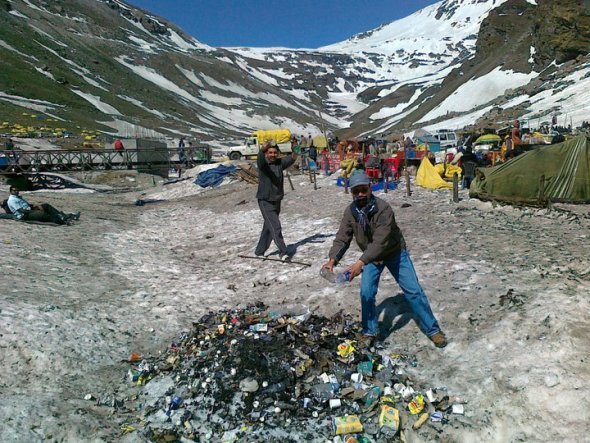 Have you ever seen the pile of plastic bottles and cans that you leave behind when the summer season closes and we try to get back to our normal lives? We never find the place as good as it was in the previous year. And this has been happening since ages. Every year we clean up the road, clean up your trash and then the next year – you come again.
Have you ever seen the pile of plastic bottles and cans that you leave behind when the summer season closes and we try to get back to our normal lives? We never find the place as good as it was in the previous year. And this has been happening since ages. Every year we clean up the road, clean up your trash and then the next year – you come again.

The himalayas desperately needs a sense of financial discipline in civic managment to improve pending works and improve quality of life !
voluptuous article ! loved it !
aha!
Great Post Tarun Goel. Wonderful! Everyone – Pls Share(fb), tweet and drop your views.
Local People of any popular Tourist place have been putting up with such difficulties.
All I can say is that We Indians have lost our Indianness(the trait of being Inclusive) and are exploiting the Natural resources based on the ‘Exclusive’ness of the Western World.
I see any quick fix to such problems as only a cosmetic fix rather than removing the root cause which needs educating Indians to be indians.
Excellent post, Tarun. We all need to be reminded how our travels can shape (or destroy) the world. I’ve shared the post with all my blog’s readers. It’s featured on my weekly travel reads section as a reminder to travel responsibly – http://the-shooting-star.com/2012/05/08/travel-writing-picks-blogosphere-1/
Very powerful article, tourism can either help or damage the region, it’s of paramount importance that travellers show the highest respect towards the places they are visiting. I’ll be sharing this piece away.
As usual, a wonderful post!
I’m sure anyone who has read till the end will be a changed explorer – in a good way.
I’m not sure how well the tribal population in question has also acted to keep out the dirt. Yes, tourists need to act humanly but locals as well can FORCE discipline.
Majority of taxi drivers in the area are locals (From kullu and lahaul dales on the two sides of Rohantag La). Yes, I agree private vehicles and taxis from plains mess up the traffic there but locals need to get their act together as well.
Remember that incident on Marhi – Rohtang route when a couple of locals thrashed a tourist. May be it was fully justified to kick his a** right there and then for being a moron, but it could have caused serious disturbance for other commuters as well. Anyways.
You have nailed it really well.
PS. the last line is killer =) Keep up the good work.
I pledge my support and vow to do whatever I can to contribute to the cause and raise awareness among the masses. Keep up the good work bro.
🙂
It’s a Heart Wrecking story of a man from the other side of the world where we wait to go and enjoy but we never think about them and their pain…….I vow to bring back whatever waste would accumulate from my journey toward Himalayas……
In fact I not actually brought back in my last trip to Kalpa but I picked up trash and kept in a corner…..I believe that was first step but as the time is running fast I need to jump on the 2nd step now and bring back my trash and whatever trash from there I can bring.
I will float it on FB and where ever possible…..
REDUCE…REUSE…RECYCLE…..
POLYTHENE BAGS, PACKAGED DRINKING PLASTIC BOTTLES, THESE TWO HAVE TO BE CARRIED BACK TO YOUR DESTINATION FOR PROPER DISPOSAL.
AVOID THROWING / DISPOSING WASTE IN NALLAHS / RIVERS HILL SIDE SLOPES ETC ETC.
TELL YOUR FRIENDS TRAVELLING WHEREEVER YOU MEET HOW DANGEROUS THE SITUATION IS GETTING OUT OF HAND IF WE DO NOT CARE OUR MOTHER EARTH. GROW TREES GIVE NATURE A CHANCE TO REVIVAL.
PEOPLES AWARENESS FOR CLEANER ENVIRONMENT………….HYDERABAD. A.P